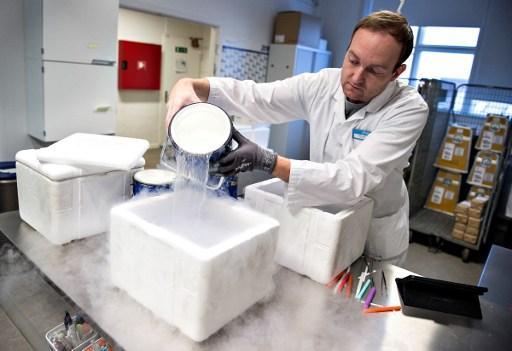Sperm banks in Belgium are seeing their supplies run low as the demand for sperm donations is increasing, which could result in people looking to become parents through sperm donations having to wait much longer than usual.
Whilst the demand for sperm donations has never been as high as it is now, the supply being donated to sperm banks in Belgium has never been this low, according to fertility expert Wim Decleer of the AZ Jan Palfijn Gent, one of the largest sperm banks in Belgium.
"We used to have a sperm bank with thousands of samples, now we are down to a few hundred. Clinics will now have to start working with waiting lists," he told Het Nieuwsblad.
"That would mean that parents would have to wait six months before they could start a treatment programme. If it does not work the first time, it will be a process of years. A difficult message for parents who want to have a baby," Decleer added.
Since 2011, the demand for sperm in the Jan Palfijn hospital in Ghent has increased by 86.4%. A clear surge was reported last year, especially among lesbian couples (28.2%) and single mothers (63.6%).
An increasing number of heterosexual couples with fertility problems are also on the rise, as couples are more often delaying the age at which they start having children, which also means there are more problems when trying to get pregnant, according to experts.
Both the University Hospital in Leuven (UZ Leuven) and in Antwerp (UZA) have witnessed a rise in demand, and in both clinics, there are already six-month-long waiting lists.
"Insemination and donor sperm are more commonplace. Lesbian couples, but certainly also singles with a desire to have children, are taking the step faster," Ilse Goovaerts, embryologist at UZA, said.
No supply to meet the demand
The main reason behind the decrease in supply is the strict requirements that are put in place for possible donors, meaning many quickly became excluded from the process.
"Of roughly 100 candidates, 16 remain. We are more strict with sperm donors than with our own partners," according to Decleer.
Although donors do receive a small compensation of €80 in Belgium, sperm banks can't legally advertise this, meaning they have to rely mainly on altruism.
At the fertility centre of Hospital Network Antwerpen (ZNA), just two new candidates signed up to become donors between March 2020 and February 2021, which resulted in ZNA launching a new campaign to attract sperm donors aged between 18 and 45.
Even in Denmark, where the largest commercial sperm bank Cryos is located, and where a lot of people looking to become parents get contributions from, there are shortages.
"That is why the price has tripled in the last six months. Depending on the choice, the price is between €300 and 950 euros per sample. If we're not careful, fertility treatments will become unaffordable and only for the happy few," he said.
According to Peter Reeslev, CEO of Cryos, sperm donation is "so normalised in Denmark" that the company has enough young donors, but he added that "the coronavirus crisis has had a heavy impact on our operation."
"So it will take some time to get our sperm bank back up to standard," Reeslev said.

